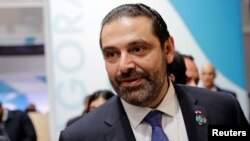Prime Minister Saad al-Hariri on Tuesday signaled reservations about International Monetary Fund (IMF) proposals for Lebanon which he said included floating the Lebanese pound, which has been pegged at its current level for more than two decades.
Hariri was speaking on the first day of a three-day parliamentary session that is expected to approve a state budget that aims to slash the deficit, as a step towards putting Lebanese state finances on a sustainable path.
Lebanon has one of the heaviest public debt burdens in the world. The state's main expenditures are the public sector wage bill, paying interest on its debt, and subsidising the loss-making state power company.
The government aims to slash the deficit through measures including a 3% point increase in tax on interest and a plan to issue low-interest treasury bonds.
Hariri was responding to criticism from MP George Adwan of the Lebanese Forces (LF) Party who noted reservations expressed by a recent IMF mission to Lebanon.
The IMF mission, in the concluding statement of an Article IV mission, said earlier this month that buying the proposed low-interest debt would worsen the central bank's balance sheet and undermine its credibility.
It also said there should also not be any pressure on private banks to purchase the low-interest debt.
Addressing the plan to issue low interest bonds, Hariri said that he, the finance minister and the central bank had agreed "this matter would be conducted in a voluntary way by banks."
"I know the IMF has some reservations, but also if we want to adopt everything the IMF does ... (well then it also) proposes that we leave the Lebanese pound to float, that it go up and down as it wants," said Hariri, asking whether this is what the Lebanese Forces wanted.
The LF is part of his cabinet, but plans to abstain from voting for the budget, saying it does not go far enough with reforms.
The IMF had also requested an increase of fuel excise in addition to an increase in VAT, Hariri said.
"I want to say that we always negotiate with the IMF in a way where we work for the interest of Lebanon, the interest of the Lebanese pound," Hariri said.
The IMF, in its statement, said Lebanon should adopt revenue measures that include raising value-added tax (VAT) and increasing fuel excises as well as efforts to increase tax compliance.
It said the draft budget together with a plan to reform the power sector were "very welcome first steps on a long road." But it said the 2019 budget deficit would likely be well above the government's target of 7.6% of gross domestic product (GDP).

